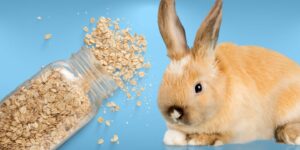Can rabbits eat corn? The short answer is no. Rabbits should not eat corn because it can be dangerous for them. Corn is harmful to rabbits due to the indigestible hulls of corn kernels and the potential presence of mycotoxins. It's essential to understand a rabbit's dietary needs and provide them with a balanced and safe diet. In this article, we will explore the dangers of corn for rabbits, the benefits of corn leaves and stalks, alternative safe foods, and tips for ensuring a healthy diet for your rabbit.
Introduction: Understanding a Rabbit's Diet
Importance of a balanced diet for rabbits
A balanced diet is crucial for maintaining a rabbit's health and wellbeing. A proper diet helps support their digestive system, immune system, and overall health.
Common safe foods for rabbits
Safe foods for rabbits include leafy greens, vegetables, hay, and high-quality pellets. Some safe leafy greens include romaine lettuce, kale, and spinach. Safe vegetables include bell peppers, cucumber, and carrots.
Foods to avoid in a rabbit's diet
Certain foods can be harmful to rabbits and should be avoided. These include corn, onions, potatoes, seeds, and high-sugar fruits.
Nutritional Content of Corn
Macronutrients in corn
Corn contains carbohydrates, proteins, and fats. While these macronutrients are essential to a rabbit's diet, the composition in corn is not ideal for rabbits.
Vitamins and minerals in corn
Corn contains vitamins like B-complex vitamins and minerals like magnesium and potassium. These nutrients are important for rabbit health, but can be obtained from other foods that are safer for rabbits to eat.
Fiber content in corn
Corn contains some dietary fiber, but the structure of the corn kernel can pose problems for a rabbit's digestive system.
Dangers of Feeding Corn to Rabbits
Indigestible polysaccharides in corn hulls
Corn hulls contain complex polysaccharides that cannot be digested by a rabbit's stomach. This can lead to gastrointestinal blockage, which is dangerous for rabbits.
Gastrointestinal blockage risks
If a rabbit ingests indigestible materials like corn hulls, they may experience gastrointestinal blockage. This can cause discomfort, pain, and even death if left untreated.
Mycotoxins in corn
Mycotoxins are naturally occurring toxins produced by molds or fungi. Corn may contain mycotoxins, which can cause toxicity in rabbits, potentially leading to kidney and liver failure.
Potential kidney and liver damage
Feeding rabbits corn that is contaminated with mycotoxins can lead to kidney and liver damage, which can be life-threatening.
Recognizing Signs of Gastrointestinal Blockage in Rabbits
Symptoms of gastrointestinal blockage
Symptoms of gastrointestinal blockage in rabbits include reduced appetite, lethargy, and discomfort. If your rabbit is experiencing any of these symptoms, it is essential to consult with a veterinarian for proper diagnosis and treatment.
How to help a rabbit with gastrointestinal blockage
If your rabbit is experiencing gastrointestinal blockage, seek veterinary care immediately. The vet may recommend treatment options such as medication or surgery to remove the blockage.
Preventing gastrointestinal blockage in rabbits
To prevent gastrointestinal blockage in rabbits, avoid feeding them corn and other indigestible materials. Instead, provide a diet that is high in fiber and appropriate for their unique digestive needs.
The Benefits of Corn Leaves and Stalks for Rabbits
Nutritional content of corn leaves and stalks
While corn kernels are harmful to rabbits, corn leaves and stalks are safe for consumption. They are high in fiber and contain some essential nutrients.
Fiber benefits for rabbit digestion
Corn leaves and stalks are high in fiber, which is beneficial for a rabbit's digestive system. Fiber aids in maintaining proper gut motility and preventing gastrointestinal issues.
How to prepare corn leaves and stalks for rabbits
When feeding your rabbit corn leaves and stalks, wash them thoroughly and chop them into smaller pieces for easier consumption.
Alternative Safe Foods for Rabbits
Leafy greens and vegetables
Leafy greens and vegetables, such as romaine lettuce, kale, spinach, bell peppers, cucumber, and carrots, are safe for rabbits to eat and provide essential nutrients.
Fruits as occasional treats
Fruits like apples, bananas, and berries can be given to rabbits as occasional treats. Keep fruit intake limited, as excessive fruit consumption can lead to digestive issues and obesity.
Recommended hay and pellet options
High-quality hay, such as Timothy hay or Orchard grass hay, should be the staple of a rabbit's diet. Offer pellets in moderation, and choose a high-quality brand that contains essential vitamins and minerals.
Tips for Feeding Your Rabbit a Balanced Diet
Importance of hay in a rabbit's diet
Hay should make up the majority of a rabbit's diet, as it provides essential fiber for maintaining a healthy digestive system.
Portion control and frequency of feeding
Feed your rabbit smaller portions of leafy greens, vegetables, and pellets throughout the day. This encourages a healthy eating schedule and prevents overeating.
Monitoring your rabbit's weight and health
Regularly monitor your rabbit's weight and overall health. If you notice any unusual behavior, changes in appetite or weight, consult with a veterinarian for guidance.
Introducing new foods to your rabbit's diet
When introducing new foods to your rabbit's diet, do so gradually to prevent shock to their digestive system. Monitor their reaction and adjust the diet accordingly.
Conclusion: Ensuring a Healthy Diet for Your Rabbit
In conclusion, rabbits cannot eat corn due to the risk of gastrointestinal blockage and toxicity. Instead, offer them a balanced and safe diet that includes hay, leafy greens, vegetables, and occasional fruit treats. By providing a nutritious and species-appropriate diet, you ensure that your rabbit remains healthy and happy.




